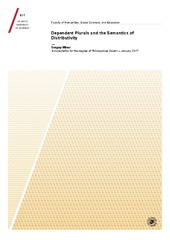Dependent Plurals and the Semantics of Distributivity
Permanent link
https://hdl.handle.net/10037/10529Date
2017-03-23Type
Doctoral thesisDoktorgradsavhandling
Author
Minor, SergeyAbstract
This thesis focuses on the semantics of distributivity, grammatical number, and cardinality predicates (i.e. numerals and quantity modifiers such as 'several'), and more generally on the way the concept of multiplicity is represented in the semantics of natural language. I argue that constructions involving so-called 'dependent plurals', i.e. plurals lacking numerals or quantity modifiers occurring in the scope of certain quantificational items such as 'all' and 'most', pose a challenge to the classical semantic framework that distinguishes between two sources of multiplicity: domain-level plurality and distributive quantification. Instead, I argue that dependent plural readings should be analysed as distinct both from cumulative readings and distributive readings, in the classical sense. I demonstrate how this can be accomplished in a semantic framework where expressions are evaluated relative to sets of assignments, or plural info states, as originally proposed by van den Berg (1990, 1994, 1996). The specific formal implementation that I propose, PCDRT*, is based on Brasoveanu’s (2007, 2008) Plural Compositional DRT, with a number of significant modifications. In this framework we are able to distinguish between two types of distributivity: weak distributivity across the assignments in a single plural info state and strong distributivity across multiple info states. I argue that both of these types of distributivity play a role in the semantics of natural language, accounting for the contrasting properties of ‘singular quantifiers’, such as 'each' and 'every', and ‘plural quantifiers’, such as 'all' and 'most'. The contrast between bare plurals and plurals involving cardinality modifiers, on the one hand, is captured in terms of the distinction between state-level and assignment- (or domain-) level plurality.
I further argue that the proposed theory is able to handle a range of phenomena particularly problematic for previous approaches, including intervention effects in dependent plural constructions, long-distance dependent plurals, and the contrast between dependent and non-dependent bare plurals in English with respect to their scopal properties.
Publisher
UiT Norges arktiske universitetUiT The Arctic University of Norway
Metadata
Show full item recordCollections
Copyright 2017 The Author(s)
The following license file are associated with this item:


 English
English norsk
norsk
